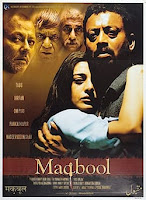Stages to Screens- Maqbool
With the rise of Bollywood’s popularity, adaptation films have been playing a prominent role in its success. These adaptations are being made to represent the good old classics with the twist of modernism in it. One such sentimental adaptation is Maqbool. It is a 2004 Indian crime drama film directed by Vishal Bhardwaj, which is based on the prominent play Macbeth, written by Shakespeare.
With the Mumbai underworld on its backdrop, this film revolves around the love story of Miyan Maqbool (portrayed by Irrfan Khan) and Nimmi (Tabu) who is a mistress. The love between them leads to the murder of Jahangir Khan a.k.a. Abba Ji (Pankaj Kapoor), who is the employer of Maqbool and also the Don. His murder leads to transfer of the Don’s throne to Maqbool which leads to guilt and a series of unfortunate events. Also, two corrupt policemen (played by Om Puri and Naseeruddin Shah) play an excellent supporting role by giving rise in numerous conflicts and playing a crucial role in the climax of the movie.
Even with changes being made in the original artwork to make it more suitable for the current audience, the plot of the movie shows multiple similarities between the adaption and its original work. The guilt and hallucination portrayed by Maqbool and Nimmi is well-incorporated and is similar to the conditions of Macbeth and Lady Macbeth after the murder. Also, the predictions made by the two corrupt policemen are indistinguishable from the predictions and manipulations done by the witches in the original plot. The subtle description of relations between Maqbool and Abba Ji, and the presentation of Lady Macbeth’s nature on screen is also alike to a huge extent.
Also, many differences could be noticed in the film to make it more suitable for the cinematic world. Like the setting of Underworld, gangsters and crime world made it more relatable to the modern perspective, along with creation of various modified roles of main characters. This was supported by the creation of a mistress rather than a wife along with her slow manipulation tricks. Another huge difference is that, Nimmi gives birth to a son whose father could be either Maqbool or Abba Ji. Unlike the suicide in the play, Nimmi dies in the arms of Maqbool.
Even if this was a failure at the box-office, this was acknowledged on an international level. It was one of its kind,and the brilliant work done by the cast members could not have been more perfect. The true artwork could be noticed in all the aspects of the movie, ranging from direction to the acting done. In its true sense, I recognised it as a cinematic masterpiece




Comments
Post a Comment